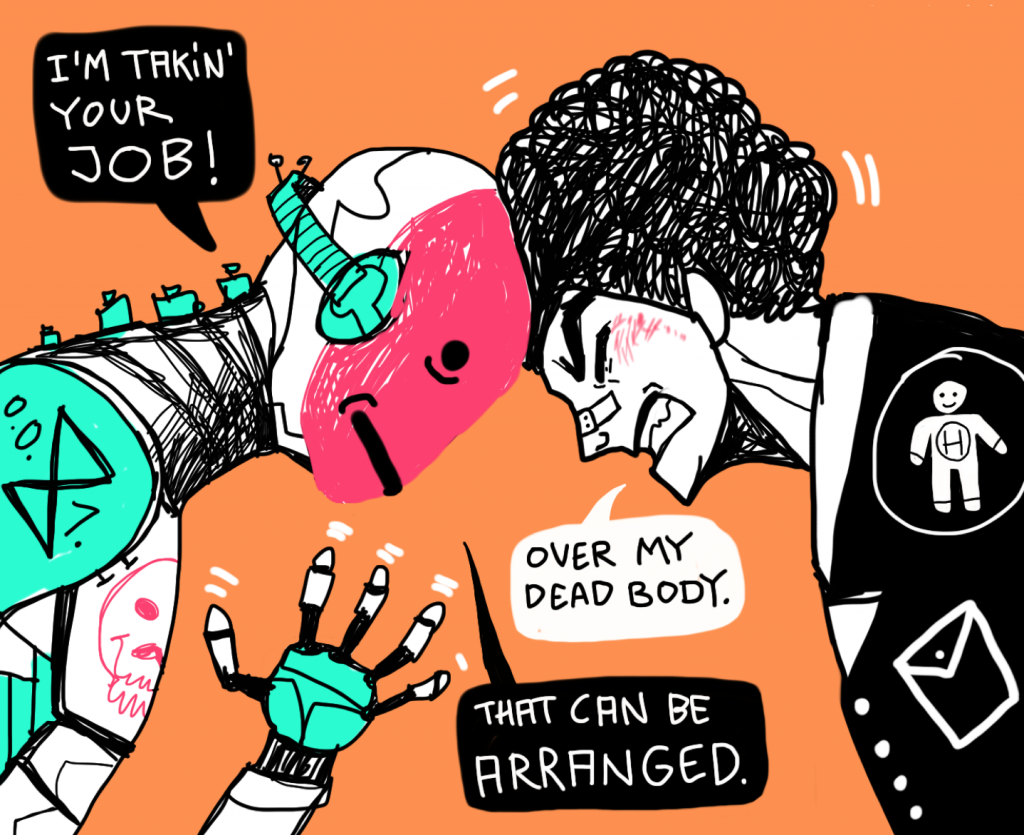A few months ago, I participated in a study to rate the quality of 10 different blog post writers. I assigned a rather difficult topic to these writers and rated the anonymous results from 1-10.
The top three posts were very close. Extremely well-written, well-researched, and interesting. As it turned out, two of the top three posts were written by a computer. Yes. Automated writing!
The bottom two posts were also easy to choose. Almost un-readable. Both of those were written by humans.
Does this make you … nervous?
If you’re a content creator like me, it should.
This is an example of computers beginning to pass the famed “Turing Test” of computer-generated content that is indistinguishable from human effort.
The news industry projects that 75 percent of its content will be bot-created by 2020. The Associated Press just announced Minor League Baseball games will be covered by computers. Labs around the world have announced computer-generated poetry, music, sci-fi novels, and rap lyrics.
When it gets to the point that a computer can consistently generate content at a level that passes the Turing Test, the economics of content in every form will change forever. Essentially, computers work for free, all day, without breaks, illness, or vacation time. What company will not want that?
We may not want to think about this, let alone process it and accept it, but the freelance writer will become an endangered species.
A strategy for surviving automated writing
Is there any way to future-proof ourselves from automated writing, or will we soon merely remember our days of human writing with nostalgia?
I don’t have the answers, but it’s an interesting thought exercise. There are three things I can come up with, and I would sincerely love to hear your thoughts in the comment section. If you want to survive the robot-writing apocalypse, there are (at least) three paths of safety:
1. Emotional connection and personal branding
In many case, the person does matter. I love the storytelling of Malcolm Gladwell. I admire the pluckish DIY views of Christopher S. Penn. I think Jay Baer is an incredibly original and insightful thinker. I am challenged to raise my personal writing game by the quality of Ann Handley’s prose. It almost doesn’t matter what they write about. I will always follow these folks because they are my content heroes.
These writers transcend the actual content. I follow them, and always will, because of who they are what they represent. They have established a personal, emotional connection with their audience, and me.
This takes time and a lot of hard work. Will a young writer even have the chance to establish a voice in this new world? Time will tell.
2. Go very deep on a topic
I don’t think computers will soon corner the market on true insight.
I’m a fan of Pittsburgh Pirates baseball and the quirky commentary of radio announcer Bob Walk. In Bob’s home-spun commentary — his “content” — he is able to derive exceptional and colorful insights on the game based on his extensive experience as an athlete and from his observations of thousands of baseball games. This depth of expertise makes the content unique and un-bot-able (a term I just made up … I hope you like it).
I think this is what will keep me in the game as well. I want to be the Bob Walk of marketing. I have done every marketing job you can think of over a 30-year career. I add the color commentary to our industry based on my depth of experience and connecting the dots from true insight.
Are you positioned as a true expert in your field? A trusted voice of experience?
3. Entertain
The other day, I was on my boat and asked my daughter to create a Snapchat story about our trip down the river. Lauren has a deep background in improv comedy and can weave an entertaining story out of anything. She effortlessly created a hilarious little video, in 10 second snap-chunks, on the fly.
(Click here if you can’t see boat video.)
If you have the talent to do that, you’re going to be just fine in this new world.
Consider the new content forms that are on the rise — Snapchat and live video. It takes a certain expressive personality to succeed.
For example, one of my marketing friends reports his daily drudgery on Snapchat. Taking the kids to practice. Unfollowed.
Another friend provides truly entertaining glimpses of his “backstory.” I’m engaged.
If you’re creating commodity content like “The 10 Best Twitter Tips” or “Snapchat for businesses” it’s going to be game over. But if you can become known for the type of content ONLY YOU can create, your future may be bot-free.
4. The counter-revolution
In a world of processed foods, people will pay more for organic. In a retail world dominated by Wal-Mart and Amazon, people will pay more for local and artisanal. I can also imagine a world where people will get fed up with bot-speak and carve out bot-free content zones.
“Always human, all the time.” Has a nice ring to it.
What about you?
That is the extent of my brain power on this subject but I bet you have some thoughts. Are you worried about automated writing and what are you going to do about it?
Original Illustration by the exceptional Mars Dorian
The post Four Strategies to survive automated writing and content bots appeared first on Schaefer Marketing Solutions: We Help Businesses {grow}.
Related Stories
- The overwhelming implications for driverless cars and marketing
- Why “rich content” is central to your social media strategy
- Keeping your content promise, even when it hurts
- Why brand building depends on the imbalances in people’s lives
- 16 Essential educational resources for the marketing professional
from {grow} http://feeds.feedblitz.com/~/162989418/0/markgrow~Four-Strategies-to-survive-automated-writing-and-content-bots/


No comments:
Post a Comment